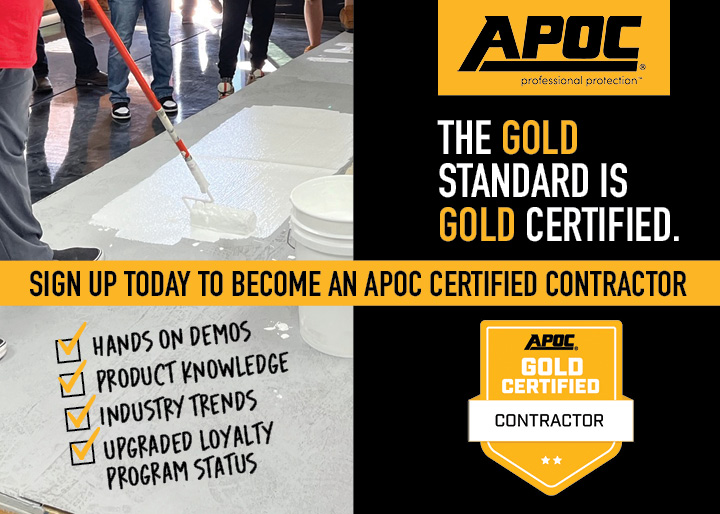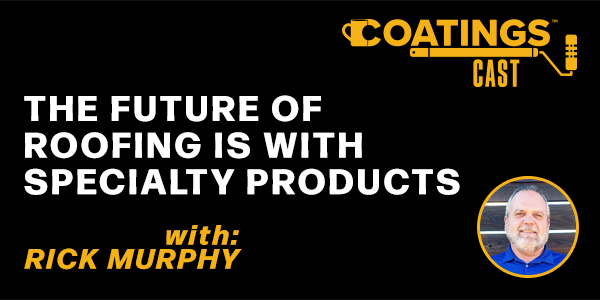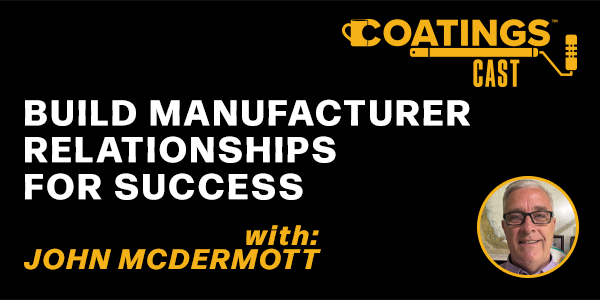UP TO THE MINUTE
The Future of Roofing is With Specialty Products - PODCAST TRANSCRIPT
December 23, 2024 at 6:00 p.m.Editor's note: The following is the transcript of a live interview with Rick Murphy of Everest. You can read the interview below or listen to the podcast.
Intro: Welcome to CoatingsCast, the ultimate podcast dedicated to the science, art and innovation of liquid and fluid-applied roofing, coatings for surfaces and waterproofing. It's time to roll up our sleeves, put on our lab coats and dive headfirst into the world of liquid protection that keeps your roofs and surfaces in prime condition. The future is here, and it's liquid, so don't miss out. This is CoatingsCast, where every drop counts in the world of roof and surface protection.
Karen Edwards: Hello, and welcome to another episode of CoatingsCast from CoatingsCoffeeShop. My name's Karen Edwards, and today we are being joined by Rick Murphy from Everest Systems to talk all about specialty products and how and why contractors should be using them. Rick, welcome.
Rick Murphy: Hi. It's nice to meet you, Karen.
Karen Edwards: Yeah, it's a pleasure to have you here. For those listening to this episode, could you just introduce yourself, tell us a little bit about you and what you do there?
Rick Murphy: Okay. Again, my name's Rick Murphy. I'm the technical support and specifications director. So one of the things at Everest, everybody wears multiple hats, so I do sales, do technical support, specifications on new products and when we come across something that's not a normal situation, generally comes to me and we try to figure out the best solution for that system. I also do a lot of the trainings and some of the demonstrations and other things. So it's been quite a ride.
Karen Edwards: Yeah, it sounds like it. You've got your hands in all different kinds of areas there.
Rick Murphy: Yeah.
Karen Edwards: So for those listening out there that might not know Everest Systems, could you give us a quick history of the company?
Rick Murphy: Okay, so Everest is approximately 12 years, since John Linnell started the company. John's been in the coating industry for over 30 years. Has worked for a lot of the different large raw material manufacturers and coating businesses and spray polyurethane foam operations, so he had decided a few years ago that it was time to quit working for the other guy and come work for himself. And one of the good things about having John, he is a chemist, so all of our products are his... They're his babies, so he's very interested in how they work out in the field and just making sure that everything's done, quality's correct and we're not using cheaper fillers or anything.
I started using his products as a contractor 10 or 11 years ago when I still had my restoration business. They were the best line of coatings that we'd ever used. The service was great. How many times could you call and actually talk to the owner of the business? It was a great start of a great relationship. We used their products for several years and had the opportunity to sell our business, and once we did that, had the opportunity to come to work for Everest.
So one of the things that I did as a contractor, I always did my own testing on everything. If they come out with a new product, they say, "Yeah, it works for this, this and this," and sometimes you find out different geographical areas, things are different or just situations are different and things don't work as well in the... Or they work better in the lab than they do out in the field. So one of the things that I always did was I like to test and make sure that things work the way they were supposed to. Plus, I wanted to make sure that if there's times that we needed to push the parameters or something, to figure out what we could do.
I was in Kansas, so spring and fall you had shorter days and dew came on and there's a lot of things that you had to figure out how to do this system and make it work in these weather conditions. So it was always fun to try new things and see what we could do and what we couldn't do. But it's been a good partnership with them, with Everest, on the contractor side and it's really been a great place to work.
Karen Edwards: Well, that's pretty impressive that you liked the company's products so much that you decided to go work for them when you sold your business. That's cool.
So I mentioned in the beginning that we're going to be talking about specialty products. Can you tell me what specialty product means to you?
Rick Murphy: Well, most of what we have are specialty products. If you look at... I don't know if any of us know how many products that we actually have. John, the owner, is constantly coming up with new innovations, new problems solved on the roof and out in the world. He's constantly looking for the next challenge and the thing that he can make. There's a lot of times that we don't even know that we have a product until somebody says, "Well, yeah, we're selling that." So it's interesting to be a part of that.
But so specialty products, I think most of our products are specialty products. We have multiple primers for different substrates. So some manufacturers, they only have acrylics, they only have silicone, they only have whatever their thing is. So we're manufacturing all of our products in Houston. We have primers for all different substrates. We have coatings for different substrates. We have a CS primer that's a masonry primer. We have two different versions of Bleed Block for asphalt systems. We have GP, which is our general purpose primer that works on most things. We have epoxy primers. We have EverCoat glaze, which is a coating for skylights. We have ponding water coatings. We have single-ply primer. All of these things, to me, can be considered specialty products. And then you can get into our Eco-Level as another, probably more thought of as a specialty product.
EverSeal is definitely a specialty product because it works for multiple surfaces. You can put it over acrylics, you can put it over metal, you can put it over single-ply, you can put it over asphalt. It will also stick to silicone, which is about the only thing I know of on the market besides silicone that-
Karen Edwards: Yeah, nothing sticks to silicone. What?
Rick Murphy: Nothing sticks to silicone, but EverSeal does.
Karen Edwards: Wow. It doesn't have plasticizers in it, right?
Rick Murphy: It does not. That's one of the big things about EverSeal is it's plasticizer-free. So what happens with other sealants out in the market, you put them down and they look great; well, you come back six months or a year later and they're getting chalky or brittle or even gone.
I did a job with another manufacturer's products about eight or ten years ago, and I was on the job myself and it was a good thing I was or I'd have been mad at my guys. So we were just sealing fasteners and seams on a metal roof, and we went through and sealed all the fasteners, all the seams. That was in the fall. They called me in the spring and said, "Hey, we've got a couple leaks," so I went out. And when I got up on the roof, I thought, "We missed this area." I got to looking around, and the whole roof was that way. And that product, just in six months time, over half of it had gone away and it was very shocking. I was just glad that I was on the job myself, or I would've thought my guys hadn't done the work.
Karen Edwards: Yeah. Yeah. Wow.
Rick Murphy: And that's plasticizer migration. That product just left the roof. So that's one of the reasons that we make EverSeal the way we do. Other manufacturers look at that and they say, "Well, you can make more money if you put plasticizers or some cheap fillers in there," but that's not what we do. We're trying to manufacture the best products that we can for a fair price. That's one of the reasons that I'm here is I feel very confident. I'm not a salesman; I do some sales. I'm not a salesman, but it's easy to sell something that you believe in.
Karen Edwards: Sure is. Wow. Explain to me the difference between a lower-volume product and a high-volume product.
Rick Murphy: So a low-volume product, it depends on how you want to answer that question. So your high-volume is going to be your coatings, spray polyurethane foam, your top coats. But low-volume would be all of the things that make up the system. Now, some of the primers, like Bleed Blocker, that could be considered a low-volume or a high-volume product because it's part of the system. But as sealants go, primers, a metal roof primer goes down a third to half a gallon a square, so compared to over two gallons a square for coatings, that's a lower-volume product. And then your sealants are all lower volume. So say if it takes a thousand gallons of coating to do the full system, the sealants that you use on that may only be a hundred gallons or whatever. So lower volume doesn't mean lower importance.
Because one of the things that we're doing is building a complete system. We don't sell products at EverSystems; we manufacture products, but we sell systems and solutions. So what we're doing is putting a full system together to come in and take care of your issues, provide the owner a value, better value, than putting a new roof on. You take the old roof off, throw it in the landfill and put a new roof on and you still may have leaks when you put the new roof on. So we come in, address all the leak areas, seal everything completely, if it needs primed, we do that first, apply our coatings. But our systems are watertight before you put the final coat on. So it's building the system and doing it correctly from the beginning to end that is where you get your success.
Karen Edwards: So that final coat really is kind of a redundant layer, right? You're already waterproof, and then that's the icing on top, right?
Rick Murphy: Yeah, the final coat is a sacrificial barrier, basically, that you're protecting all the work that you've done initially. Plus, it's also extremely reflective. I've done some testing where you've taken temperature readings on a... Say you take a galvanized metal roof. So they'll get up to 170 degrees during the day on a hot day. So with our coating on them, they will get up to 10 degrees above ambient temperature. So one of the things you do by restoring a roof with one of our systems, say in the summertime, it's 70 degrees in the morning and it's 100 in the afternoon. So with the galvanized roof, that roof has gone from 70 degrees to 170 degrees. It's expanded over 100 degrees. So if you do one of our systems over that, you've gone from 70 to maybe 110, so you've only expanded over 40 degrees. So you take the expansion and contraction out of that roof, and it just makes sense that it's going to last longer.
Karen Edwards: I was just going to say that. That makes a lot of sense. Yeah, it's not as hard on the roof by having that on there. Okay. I want to talk about your one product that you have, and correct me if I'm saying this wrong, Silkoxy?
Rick Murphy: Silkoxy.
Karen Edwards: Tell me, yeah, a little bit about that.
Rick Murphy: Silkoxy is our silicone line. Excuse me. There are only two manufacturers that have an alkoxy-blend silicone. And the alkoxy, one of the great things about it is it doesn't smell. So what happens if you're on a school, a hospital, some kind of building that has a lot of air intake, if you're using a product that smells, it's going to come through their ventilation system and then people are going to be upset with you. I've actually been run off a roof because of that with products back in the past. Yeah.
Karen Edwards: Wow. Yeah. Not good.
Rick Murphy: Anyway, so that happened. So smell is a big thing. It doesn't have to be mixed. All the other manufacturers, as far as I know, all of their products have to be mixed. So you open a bucket, you stir it or open a drum, you mix it before you use it. And then adhesion, so one of the things that... The alkoxy formula has better adhesion, so most of the time you don't need a primer for anything.
So with the Silkoxy line, we have two different versions. We've got H3 and EZ coating, which is... They're both high solids, just different viscosity. We have our F1 filler. That's a silicone filler for gravel roofs. So if you've got a torn gravel roof that you want to restore, we can come in and clean that roof, apply our bleed-blocking primer and F1 filler from three gallons per square on up depending on how coarse the gravel is and then we put our finished coat of EZ or H3 on top of that. We also have Silkoxy Flashing Grade that is for flashing details. And Silkoxy Patch is our newest line in our silicone line, and it is fibered silicone and it will stick to damp surfaces, it will work underwater. So if you've got a roof leaking, come out in the rain, you need to fix something, it will work for that. So it's the only silicone product that I know of on the market that will actually stick to a wet surface.
Karen Edwards: Wow. That's impressive.
Rick Murphy: There may be something else out there, but I've never seen it.
Karen Edwards: Right. Right. Now, you mentioned earlier all the different solutions that you have and all the different specialty products, one that you mentioned was addressing ponding water. And I know that's a problem on a lot of roofs, and obviously it needs to be eliminated before you restore the roof. So tell me a little bit about that product and how it works.
Rick Murphy: So Eco-Level we've had for, I think three years now. It was developed to eliminate ponds, but when we developed it, we didn't have any idea how huge a market it was going to be for that. We introduced it at one of the roof shows, and it was the most viewed thing that we did. Everybody was excited about it. So it's a two-part chemical, comes in a two-and-a-half or a five-gallon pail. When you open the bucket, there's a liner sitting in the top of it with a pouch that has the A chemical. You pull the liner and the pouch out, you've got the B. So you mix it, you mix the B, pour the A in, mix it and once it's mixed thoroughly, you can dump it into your whatever you're doing. So one of the things... You've got ponding areas on a roof that hold water. Well, we do have some ponding water products that will help with those, but the best thing to do is get rid of the pond. So if you can get rid of the pond, that's a great thing.
We do restore a lot of asphalt roofs, and mod-bit roofs in particular will have some blisters here and there, so one of the other reasons or one of the other things we can do with it is cut those blisters out, fill it with the Eco-Level and now you've got smooth surface that's not holding water. Another issue, blisters on foam roofs. Somebody may do a big roof and have two or three blisters, and you can come out with $150,000 foam rig and three guys to get the hose up there to spray foam on a one foot in diameter area and cost you a fortune or you can buy a kit of Eco-Level and one guy can come out and mix it up, pour it in that hole and put a coating on it within the hour and go home. So works really well for that. Another issue are people come in on a metal roof and put a vent in and don't flash it correctly, so it holds water above that vent. We get a lot of people that are using it to get rid of those bonding areas above vents on metal roofs.
Karen Edwards: Wow. So solutions that you didn't even know when you created the product, right?
Rick Murphy: Right. Yeah. We've had people that filled potholes with them and drywalls. So, yeah, it's a pretty neat product. But it has to be coated. It's not UV-stable. And one of the things you need to... If you're using an acrylic, it needs to be coated that day. Silicone gives you a little bit longer window, but you mix it up and you better have it in place within 15 minutes because it's going to set up in your bucket and within an hour you can coat it.
Karen Edwards: Wow. Okay, so that's pretty quick.
Rick Murphy: Yeah, it is. It is.
Karen Edwards: Wow, that's cool. I love seeing unique, innovative solutions like that that were developed because people were facing a problem. You've come up with a solution that works so well. It's been adapted and used in different applications than it was originally intended. That's very cool.
Okay, so let's talk... I want to know more, too, about EverSeal, you mentioned that earlier, because it sticks to everything. Why? What makes it able to stick to silicone, or is that the secret sauce?
Rick Murphy: That is the secret sauce. We have a lot of things that have secret sauce. So EverSeal comes in 10-ounce tubes, 28-ounce tubes, one-gallon, two-gallon, five-gallon pails. We also have a pumpable version that you can run through a big coating rig and do seams and fasteners on a roof that way. We also have people that use some bulk caulking guns, Roof Tube, different things to apply that product. But EverSeal is... If you could only have one of our products, EverSeal would be the one that works everywhere. Works on all different roof substrates, works for all different things. If you ask my wife, she said, "You can even put soles back on shoes." She had a pair of shoes, her favorite shoes, that the sole came off of and so I fixed it with EverSeal.
Karen Edwards: Oh, that's sweet.
Rick Murphy: And that's one of our jokes. When something breaks, "Well, can't you fix it with EverSeal?" It's quite a product. But it works for everything. And you can coat it with an acrylic, you can coat it with silicone, you can coat it with... You can paint it, whatever you want to do.
Karen Edwards: Wow. It is the must-have tool in every contractor's toolbox, it sounds like.
Rick Murphy: Yeah. Yep. Yeah, if you could only have one of our products, that would be the one.
Karen Edwards: Yeah. Yeah, that's impressive. So tell me a little bit about... You said made in the USA. Everything's made in Houston. What does it look like if a contractor wants to get their hands on your product and try it? What do they need to do?
Rick Murphy: They can reach out to us. Best thing to do is be call Houston, and we'll put you in touch with whoever the local rep is for your area. You can email us, you can get our website, call in. I get calls quite often for people that are in my area. They'll say, "Hey, you need to call so-and-so," or I'll get an email. So best thing to do is just call in, and we'll get you in touch with the correct person.
Karen Edwards: Do you distribute throughout the US and Canada? What's that look like?
Rick Murphy: We are direct-to-contractor is our main-
Karen Edwards: Okay, that's unique. Yeah.
Rick Murphy: Yep, it is. It is. Yep. And as a contractor, I like that. I prefer that. One of the things, we're not selling to everybody. Like I said earlier, we're selling systems and solutions, not just products. If you go through distribution, you have no idea who's getting your product or how they're going to use it. And one of the things that we try to do is educate or contractors to use products correctly to make sure that, one, the products work as they're intended and two, use all the solutions that are on the roof.
Karen Edwards: So are you offering training certification for contractors?
Rick Murphy: We do. We have a contractors' conference early in the year every year. We do some regional trainings. We can do job site trainings. If we've got somebody that's using our product, and maybe they've been using somebody else's and come over to us and we may go out and just spend some time with them on the first job or two just to make sure that they're doing things the way that we want them done. But we're trying to do three or four trainings in Houston, and then throughout the year our sales reps do trainings in their area. And if it's something specific, we've got some guys like myself and a few others that can go out and take care of that stuff too.
Karen Edwards: If you run into something unusual or extremely challenging on the roof, Rick to the rescue, right?
Rick Murphy: Yeah. Yep. I say I get all the problems.
Karen Edwards: Well, that means you're good at solving them, so that says a lot to your experience, your background and your knowledge. So take it as a flattery moment.
Rick Murphy: Well, thank you.
Karen Edwards: Awesome. Well, this was an excellent conversation. I learned a lot about your solutions. I love that you are selling systems and that you are making sure the contractors are properly trained and installing the products correctly, because that leads to better performance, right?
Rick Murphy: Yes, it does.
Karen Edwards: Yeah. Yeah. Well, Rick, thank you so much for being here today. It was a pleasure to have you, and thank you to everyone out there for listening. If you want to learn more about Everest Systems, they do have a full directory on coatingscoffeeshop.com. You can visit that, and it'll have their contact information and information about the stuff that we talked about today so you can do a deeper dive and learn more. Be sure to follow us on social media. We don't want you to miss a thing. And we hope to see you on a future episode of CoatingsCast.
Outro: Thanks for joining us on this coating adventure. Stay tuned for more episodes, and in the meantime, be sure to follow us on social media to stay updated with all things roof coatings. Until next time, stay coated. For more information, go to coatingscoffeeshop.com.





















Comments
Leave a Reply
Have an account? Login to leave a comment!
Sign In